Dimming the light of the west
THERE is an exquisite Jamaican saying, 'When dog have money, him buy cheese.' That is most applicable to our national spending on tertiary education. The expression means we recklessly purchase unnecessary items when we get excess funds.
Hosein R and Tewarie B (2007) saw this recklessness concerning our tertiary education (from 1997 onwards) and its financing as due to the 'resource curse'. But it is more a populist chainreac tion response by our politicians; by 2016, we were spending $650 million annually! We may have covered it with fancy words, but winning elections was the objective. In so doing, we reduced the quality of the education offered while keeping the class system firmly in place.
'An analysis of students' living standards showed that the Dollar for Dollar programme permitted some students who were able to finance themselves (to) carry the luxury of using the government subsidy for consumption. It did not promote social equity.' (Tewarie, Franklin and Hosein, 2004) Our politicians, following the advice of some academics, recklessly spent our oil largesse, simultaneously minimising COSTAATT's (College of Science, Technology and Applied Arts of Trinidad and Tobago's) role as a community college and giving money to privileged students.
Despite the high-sounding Vision 2020 document, which advocated the importance of developing 'a highly skilled, well-educated people aspiring to a local culture of excellence that is driven by equal access to learning opportunities' requiring a 'needs-based financial support system', the final 2007 GATE (Government Assistance for Tuition Expenses Programme) design recklessly ignored that recommendation.
Why is it beneficial to have a research university? While a core function of universities has been teaching, applied science or research universities drive innovation and entrepreneurial ideas. A research university links with business and creates opportunities to stimulate required economic growth. Universities are significant in providing fertile knowledgeintensive environments and links to Government subsidies to promote enterprise innovation. In this context, we can grieve the unfulfilled dream of Tamana InTech Park or recognise the international and ground-breaking contributions of Prof St Clair King, now of Ixanos Ltd, and Dr Kim Mallalieu, the long-standing Telecommunications Authority of Trinidad and Tobago (TATT) deputy board chairman.
Visionless, Trinidad got this result: 'By the mid-1990s, the financial situation had improved, and a new era of building and general expansion began, funded in part by massive loans from the IDB, as well as subventions and capital grants from the national government.... Many new programmes, undergraduate and postgraduate, were introduced in this period, and some departments or programmes were seriously stretched to accommodate the rapidly rising enrolments.' (Brereton, January 2021) While The UWI (The University of the West Indies), St Augustine, took over 54 years to get to a student body of 8,000 students, enrolment at the institution had reached 17,000 by 2021. It is this challenge that The UWI leadership failed to confront. They apparently had neither stature nor vision to conceptualise or implement what the institution should be and how it would fit into the broader educational system.
Was The UWI leadership, local and regional, so enthralled with power that they could not head off the pending mess? There appears to have been no recognition of the impact of massificationan expansion in the number of students and a dramatic increase in the number and kinds of academic institutions.
Increasingly complex environments require more sophisticated universities. Traditional academic governance typically leaves major decisions in the hands of senior professors. Now it requires increased accountability- not only for the expenditure of funds but also for student achievement and faculty productivity.
To attract international recognition, the university must emphasise citations (a proxy for excellence). There is a need to reconcile the bureaucracy and the community of scholars. Managing the political demands of the regional governments is an important
task. These realities may sometimes appear contradictory yet require reconciliation: their absence results in Prime Minister Dr Keith Rowley's weeping.
In this setting, the privatesector tertiary institutions rose to be the undisputed winners. They mushroomed under the GATE regime. The UWI floundered, trying to decipher their future. The for-profit institutions deliver questionable education, often through 'franchises', and many students do not complete their degrees or acquired qualifications on paper, which do not match the skills claimed by these programmes. An unholy mess created by political choices!
With lax oversight by the accreditation body, these private institutions created an industry of low-quality programmes offered at high costs. They capitalise on increasing enrolment and the revenue they derive from GATE.
The inadequate quality of their graduates leads to no improvement in their job chances. The national economy does not benefit, while The UWI morphed into a fossilised institution. Research and advancements in its library system go abegging. How, then, can it create applied research or innovative breakthroughs?
Without a leader who enjoys the confidence of the governments and the wisdom to build bridges with the labour market and business communities while prodding for change in the scholarly community, Dr Rowley's lament will remain. The money allocated to tertiary education will continue to be transferred into private pockets and propping up the academic elite, even as the nation becomes less prepared to face the impact of globalisation.
The UWI and the private sector must create an entrepreneurial and innovative ecosystem for the national good. Politicians cannot lead this effort. Will we change our ways?
(Disclosure: I am a UWI graduate. I was the managing director of the privately owned Bermudez Group Ltd, chaired by Robert Bermudez, the incumbent Chancellor. He has had no input in this column.)
Photo: NOBLE PHILIP
There is a need to reconcile the bureaucracy and the community of scholars. Managing the political demands of the regional governments is an important task

